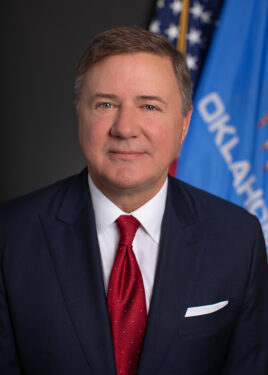
WASHINGTON — The Oklahoma Supreme Court denied a request Nov. 14 by the State Department of Education and Ryan Walters, Superintendent of Public Instruction, to intervene in a case about a potential Catholic virtual charter school in the state.
The court’s ruling gave no details but simply said Walter’s appeal to dismiss the lawsuit against the school was denied. In a separate decision it ruled that the charter school could intervene in the case.
Walters said the suit against the school by state Attorney General Gentner Drummond was “misguided.” In a motion filed in early November, Walters said he wished to defend the state’s education department’s “interest in distributing state aid without religious discrimination.”
Drummond filed his suit Oct. 20 after the Oklahoma Statewide Virtual Charter School Board approved the charter school board’s contract. The board had approved the creation of the school in June.
The state’s Supreme Court could rule in this case in a few weeks.
In the meantime, the school also faces another challenge from a lawsuit filed this summer by a group led by Americans United for the Separation of Church and State, the American Civil Liberties Union, the Education Law Center, and Freedom from Religion Foundation.
Both lawsuits cited a provision in the Oklahoma Constitution which says: “No public money or property shall ever be appropriated, applied, donated, or used, directly or indirectly, for the use, benefit, or support of any sect, church, denomination, or system of religion, or for the use, benefit, or support of any priest, preacher, minister, or other religious teacher or dignitary, or sectarian institution.”
In his suit against the virtual charter school, Drummond said the charter board’s contract approval “violated the religious liberty of every Oklahoman” by forcing state residents to fund “the teachings of a specific religious sect with our tax dollars.”
“Today, Oklahomans are being compelled to fund Catholicism,” Drummond said. St. Isidore of Seville Virtual Catholic School would be the first religious charter school in the country to be funded by public tax money.
Unless it is barred from opening by a court order, the free school for Oklahoma students in grades K-through-12, is expected to have an initial enrollment of 500 students, with the hope of increasing it to 1,500 students by 2028.
The school was created by the Archdiocese of Oklahoma City and the Diocese of Tulsa.
The U.S. Supreme Court has established that religious schools could receive government funding from grants and school voucher programs, but it will take more litigation for courts to determine if a publicly funded school can promote a particular religion.
After the state school board approved the application for St. Isidore of Seville Virtual School in June, Brett Farley, the executive director of the Catholic Conference of Oklahoma, said he was elated. “Parents continue to demand more options for their kids, and we are committed to help provide them,” he added.
In March, he told The Tablet there would be mixed feelings no matter what the school board’s final decision would be, saying: “Folks will be cheering or jeering.”
The school is named after the patron saint of the internet, for essentially creating an encyclopedia in the 600s. The idea for this school was first presented to state officials in 2021 and has been on a rocky road since, with both support and pushback for it.
Farley said the virtual Catholic charter school would “advance religious liberty and educational school choice at the same time” while fulfilling the Catholic Church’s mission to reach out where there are vast needs, especially in rural areas and for students with special needs.
The Oklahoma Catholic Conference thought the time was ripe for this application, he said, particularly after the Supreme Court’s Carson decision last year that said Maine’s exclusion of religious schools from a state tuition program for towns without public high schools violated the free exercise clause.
